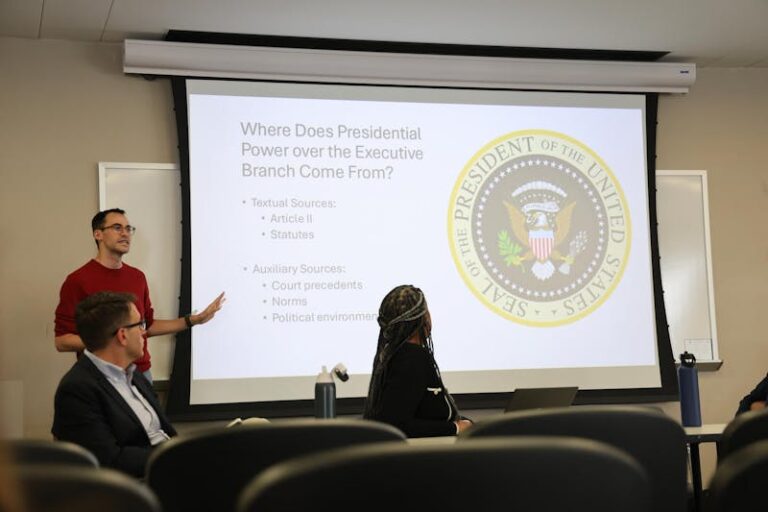Students and faculty gathered in the Anthropology Building on Oct. 20 to hear professors from Emory University’s Department of Political Science preview their Spring 2026 courses, many of which were focused on multicultural political perspectives. During the event, professors described their classes, often tying political theory and history to modern-day issues.
Associate Professor of Political Science Alexander Bolton began the talk with an overview of his upcoming course, POLS 494: Research Topics Seminar in Political Science: Power, Politics, and Law in the U.S. Executive Branch. The course will focus on current legal and political controversies and their relationships to presidential power.
Bolton emphasized the connection between contemporary political issues and “timeless” debates about presidential power. He posed questions that would guide classroom discussions around the legality of presidential decisions.
“Where does this presidential power come from?” Bolton asked. “Can the president do that? Often, on the flip side, there’s this question of, can Congress prevent presidents from doing this?”
Associate Professor of Political Science Andra Gillespie followed Bolton’s discussion by describing her course, POLS 346: African American Politics. Gillespie highlighted that the purpose of the class is to understand the different perspectives of history and politics.
“There’s a history in the United States of marginalization that suggests that people who are coming from other backgrounds may have been treated differently on account of their racial identity,” Gillespie said. “What we’re trying to get at in the course of these classes is understanding … how that history is actually going to give people a different outlook.”
Gillespie mentioned that she was “pleased” with the number of ethnically and politically diverse class offerings.
Many panelists described the importance of having racial and ethnic diversity in the political science department’s class offerings. Associate Professor of Political Science Luis Martinez introduced POLS 331: Latin American Politics, a course that examines the region’s historical and current political situation.
Martinez mentioned that a large component of the class “has to do with the role of gender in politics.”
To illustrate this issue, Martinez described the political system in Ecuador and how men and women cast ballots separately. One of his research projects focuses on revealing gendered voting patterns and the difficulty women experience in obtaining political positions.
Associate Professor of Political Science Judd Owen closed the event with an introduction to his classes on political philosophy — POLS 385: Political Science: Might and Right and POLS 490R: Advanced Seminar: Plato’s Republic.
Owen emphasized the importance of understanding the history of political science and applying them to contemporary issues.
“This is the area of political science in which we ask the big questions, the foundational questions, the perennial questions that have arisen over the course of human history,” Owen said.
Assistant Teaching Professor of Political Science and Director of Experiential Learning Matthew Baker, who organized the event, highlighted that the panel was meant to give students more insight into the political science department at Emory.
“It was just designed to give students some introduction to four faculty members that are teaching classes in the spring, some old and some new, and for them just to learn a little bit more, get a preview of what they might expect in the spring,” Baker said.
Maria Machioni (28C), an international studies and business double major, mentioned that she enjoyed how political science professors are involved in research surrounding contemporary issues.
“It was cool to see that so many professors are very involved with what’s going on currently,” Machioni said.
Santiago Pailhe (28C), a double major in political science and philosophy, politics and law, mentioned that he enjoyed the variety of class topics in the political science department.
“It’s refreshing to find classes that engage with politics outside of the U.S. in such a very detailed and comprehensive manner,” Pailhe said. “I really like the balance between research-based modern classes and theory-based political theory and philosophy classes.”
He also emphasized the importance of hearing about the research that political science professors do at Emory.
“It was very insightful for me as a political science major to get a sense of what the current professors in Emory are doing, what the current research interests are, and some meaningful conclusions from the research,” Pailhe said.
Avery Uffelmann (25Ox, 27C), studying anthropology and human biology and international studies, mentioned that events like the panel are helpful for garnering “more interaction and involvement” within the political science department.
Uffelmann added that the event helped students connect with professors.
“There are professors and people that are in the department who are putting forth the effort to put on events like these and they are willing to support them in their goals,” Uffelman said.
Ryan Wang (25Ox, 27C), a data science and political science major, reflected on how the event gave him an opportunity to connect with peers and faculty in the department.
“It’s a good way to bring the political science community together,” Wang said. “We got a chance to interact with other political science majors. We got a chance to ask the faculty questions, maybe get involved in some of the opportunities that they have for students.”
Contributing Writer James Schechner (29C) contributed to reporting.
Images are for reference only.Images and contents gathered automatic from google or 3rd party sources.All rights on the images and contents are with their legal original owners.
